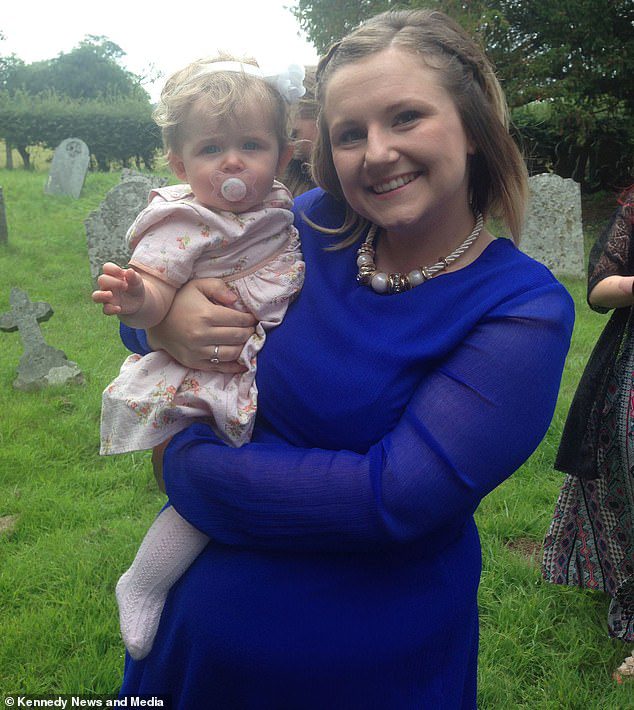
A remarkable story has emerged about a mother from Worcestershire, whose extraordinary journey of surviving the deadliest form of brain cancer has astonished medical professionals. Jade Collett, a mother of one, has bravely lived with a glioblastoma for over ten years, defying the grim prognosis typically associated with this aggressive tumor.
Glioblastomas are particularly aggressive brain tumors that, in most cases, lead to a life expectancy of only 12 to 18 months after diagnosis.
Notable figures who have succumbed to this disease include Labour MP Tessa Jowell, who passed away merely a year post-diagnosis, and Tom Parker, the singer from The Wanted, who lost his battle at the young age of 33—less than 18 months after his tumor was detected.
At 32, Jade attributes her remarkable survival partly to the early detection of her condition, which was prompted by a peculiar symptom she experienced during a night out with friends.
Ten years ago, at just 22, Jade began to notice abnormalities in her gait while socializing. Her foot had begun to bend, causing her toes to point outward.
While her friends initially dismissed the incident as a result of her inebriation, Jade soon experienced excruciating pain in her foot, prompting her to seek medical attention.
The day after her symptoms emerged, she visited her general practitioner, who ordered an MRI scan and further evaluations.

Jade Collett with her daughter Grace, who is now 10. The unusual symptom of her foot bending outwards, which was initially dismissed, turned out to be a significant warning sign of her life-threatening condition.


An MRI scan revealed that Jade had a tumor in her motor cortex, impacting her foot movement. Doctors indicated that the unusual symptom of her foot turning outward was a stroke of luck, as it was the sole indicator of her brain tumor.
The MRI scan revealed a tumor located in her motor cortex, a part of the brain that regulates movement, which was the source of her mobility issues.
A biopsy later determined that the tumor was a grade 4 glioblastoma, classified as one of the fastest-growing brain cancers, generally offering a life expectancy of merely 12 to 18 months.
Doctors informed Jade that she had around two years to live, leaving her devastated as she began to confront the reality of saying goodbye to her one-year-old daughter, Grace.
Reflecting on that life-altering moment, Jade shared, ‘I was out with friends when my foot started to turn outwards unexpectedly.
‘Initially, I thought it might be related to my hip dysplasia from pregnancy or perhaps a pinched nerve.
‘While my friends assumed it was just a funny incident, the pain became increasingly unbearable. I eventually had to be carried home, unable to place my foot on the ground.

Jade Collett remains unable to work due to her tumor. While her foot still bears the bend and numbness, she continues to defy doctors’ predictions about her prognosis.

Jade expresses her desire to keep fighting for her daughter, Grace, and remains thankful for the unusual symptom that led to her diagnosis.
‘All my friends thought I was just having a drunken moment and laughed me off,’ she recounted.
‘However, the next day, the numbness and pain persisted, making it impossible for me to walk.’
Upon receiving her diagnosis, Jade recalled feeling frozen in disbelief. ‘I couldn’t speak or cry; I just sat in silence, overwhelmed by the reality of the situation. My only thought was about Grace, who wasn’t even a year old at the time. I asked how much time I had left, and was told I had a maximum of two years.’
‘Doctors conveyed that the tumor was inoperable; any surgery could leave me disabled. They suggested treatment merely to stabilize my condition and prolong my life as much as possible.’
Shortly after her diagnosis, Jade began chemotherapy and radiation therapy. To date, she has not required additional treatments to manage her tumor.
Although her foot continues to be affected, she has surpassed the two-year prognosis given to her. Medical professionals are left puzzled and cannot explain why her tumor has remained stable.
‘The first two years were a constant struggle, feeling as though I was just waiting for the inevitable,’ she admitted. ‘It put me in a state of limbo where I felt incapable of planning for the future.’
‘I had prepared my will and even organized my funeral — something I never imagined I would have to do at 22. Nevertheless, my motivation to persevere has always been my daughter, Grace. I consider myself incredibly fortunate and resolved to continue living my life.’
‘It’s been nine years since my treatment began, and I’ve not needed any further interventions since. The doctors are at a loss for words, calling my situation a miracle. They simply can’t fathom how I’ve been able to maintain my health.’
Ms. Collett expressed her gratitude for her life, noting that less than one percent of individuals diagnosed with glioblastoma survive this long.
‘My foot undoubtedly played a pivotal role in saving my life,’ she stated. ‘I’m thankful for that bizarre symptom. Without it, I might not have discovered my condition in time. Each day, I am filled with gratitude.’
Annually, around 2,500 people in the UK and approximately 12,000 in the USA are diagnosed with glioblastoma.
Common symptoms of this condition can include persistent headaches, seizures, nausea, lethargy, visual disturbances, and alterations in personality.
These symptoms occur as the tumor exerts increasing pressure on the brain. Treatment typically involves surgery, chemotherapy, and radiotherapy, but results are usually temporary, offering limited extensions of life.









